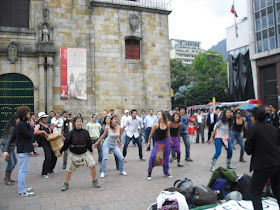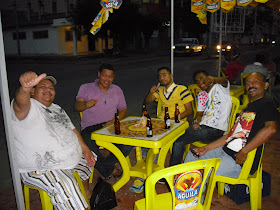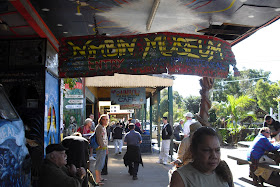There are two basic ways you can gather
information about a place. One option is to speak to the people who have been
there to get their thoughts on the location or else you can go and discover it
for yourself.
Obviously, where possible, the latter option is far more
beneficial. Reality, after all, is what you perceive it to be.
Therefore, your
perceptions of anything should be greatly increased by witnessing it.
 |
| Typical Colombian scene, so some think. |
Of course, in a world where we can be ‘virtually’ transplanted to any part of the globe in
seconds, many people like to think they’ve a decent idea of far-flung places
without actually having been there. But knowledge gained in this fashion is
very much dependent on the source.
Specifically speaking, here at ‘Wrong Way’ we
were given a reminder of the outside perception of Colombia this week,
particular that of the richer Western world. It’s a view that, thankfully, we had
almost forgotten after having being based here for some time.
What we’re referring to is, in short, the thinking that Colombia is a relatively backward, extremely unsafe and unstable country where locals and expats alike live in constant fear for their lives.
What we’re referring to is, in short, the thinking that Colombia is a relatively backward, extremely unsafe and unstable country where locals and expats alike live in constant fear for their lives.
It’s an image that the state is desperately, but
seemingly with little success, trying to shake off – the national tourist board’s
slogan of ‘The only danger is wanting to stay’ being one semi-humorous attempt
to portray a more positive global impression.
What got us thinking of this largely
misplaced negative global opinion about Colombia were a couple of emails we
received from home expressing concern for our safety in Bogotá.
What’s more,
the reason why there was worry from the ‘motherland’ wasn’t even based on
first-hand information.
An elderly uncle living in Chicago saw on the news there that, we can only assume, it had all ‘kicked off’ in Colombia. This, again we have to suppose, all spiralled from a US news report on the killing of 11 Colombian soldiers by Farc rebels, in the department of Arauca, 250 miles north-east of Bogotá.
An elderly uncle living in Chicago saw on the news there that, we can only assume, it had all ‘kicked off’ in Colombia. This, again we have to suppose, all spiralled from a US news report on the killing of 11 Colombian soldiers by Farc rebels, in the department of Arauca, 250 miles north-east of Bogotá.
Now, terrible as that is, it does not mean the whole
country is under siege. But for many people, including some foreign journalists
who live in environments here which are quite removed from the daily lives of
the vast majority of locals, such an incident fits perfectly into their image
of a volatile country. Therefore, any killing here is a sign of Colombia’s
endemic insecurity.
Just to contrast, at the same time of the
murders of the Colombian soldiers, you had a Muslim radical killing an innocent
group of Jews in Toulouse, France. Again, an awful tragedy and considering the
victims were civilians you could make a case that it was a greater act of evil
than the events in Arauca.
Yet nobody – as far as we are aware – took this as a
sign that France is on the brink, a place where bloodshed and general mayhem
are rife. Such thinking would be just silly, right?
From our experiences, daily life in
Colombia and Bogotá specifically, in terms of the feeling of security, is on a
par with what you get in France or other similar countries.
 |
| 'Dangerous' Bogotá - a harmless student protest dance. |
Yes, there are dangerous
people and areas best to be avoided, but these exist in every city or country,
especially heavily populated ones.
It must be pointed out at this stage
that ignorance can be just as dangerous as it is sometimes bliss. On that
front, we might be guilty of not being fully aware of all the risks that
potentially exist here – our first-hand knowledge of the country after all is
just over three years old and hap-hazard at that.
Many of the locals, especially those from the upper classes, tend to perpetuate the belief that the place is very dangerous. Who are we to disagree with those who were actually born and bred here?
Many of the locals, especially those from the upper classes, tend to perpetuate the belief that the place is very dangerous. Who are we to disagree with those who were actually born and bred here?
These people, however, are inclined to stay in their
‘safe-zones’, rarely venturing outside of them into what they perceive as no-go areas. Such practices are based on decades of fierce instability,
something which understandably takes time to move on from.
Nevertheless, going by what we have
personally seen and encountered, as well as what other foreigners tell us, we
happily must state Colombia seems a reasonably safe place.
For the rest of our
time in the country, here’s hoping we can continue to spread such a message.





